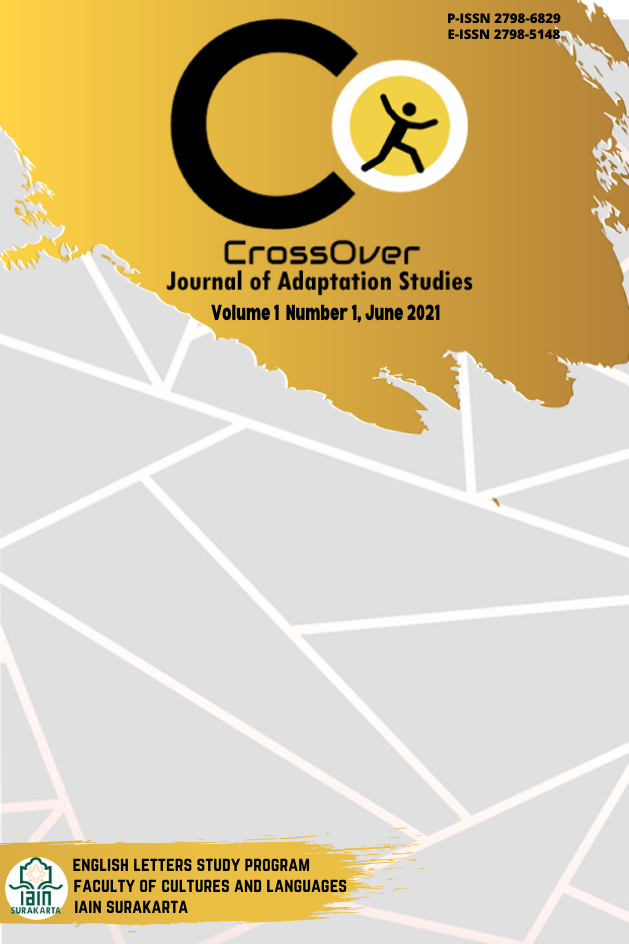HERO’S JOURNEY SHIFT OF HERCULES FROM MOORE’S HERCULES: THE THRACIAN WARS TO ITS MOVIE ADAPTATION
DOI:
https://doi.org/10.22515/crossover.v1i1.3694Abstract
This study was aimed to reveal the shift of hero’s journey archetypes in presenting Moore’s Hercules comic book to its movie adaptation. Therefore, the researcher dealt with the comic book and the movie adaptation as the object of the study, in which adaptation and archetypes frames are applied as the theories to analyze the data. The result of the study was the explanation upon the shifts appeared in the adapted work and the reasons behind the shifts. This research belonged to the qualitative research field. To collect the data, the researcher used the documentation technique. Then the collected data were arranged based on its classification. The technique of analyzing the data was content analysis. It was meant to draw the pattern of archetypes that is seen within the content both in comic book and its movie adaptation. Furthermore, making shifts in the product of adaptation in regard to the audiences was considered as the pattern, too. Based on the analysis, it was found that the movie adaptation was unfaithful adaptation towards Moore’s. The comic book version delivered the story in sadistic and bloody tone which could be seen from the pictorial images in the panels or words within the balloon text. It was such a contradiction with what were presented in the movie version. The researcher found that the comic book version brought Hercules in a “rampant mode”, while the movie version presented him in a “savior mode”. There were two reasons why the adapter made these shifts. It was because of the values that were believed by the target audiences and because the movie production had to deal with the law, culture, and movie industry movement. Thus, inappropriate things had to be replaced or transformed to be more acceptable for the wider societies.
Downloads
References
Abrams, M.H. 1999. A Glossary of Literary Terms. USA: Heinle & Heinle
Athreon, Rachel. 2015. Comics as Movie, Movie as Comics; The Examples of Alan Moore, Daniel Clowes, and Harvey Pekar. Honor Thesis. (378)
Bowen, Glenn. 2009. Document Analysis as a Qualitative Research. Qualitative Research Journal. 9 (2).
Campbell, Joseph. 1949. The Hero with a Thousand Faces. Pantheon Books.
Cassandra Primo. 2018. Balancing Gender and Power: How Disney’s Hercules Fails to Go the Distance. Social Science. 7 (11).
Claus, J. James. 2018. “Now My Charms are All O’erthrown”: Intertextuality and the Themes of Succesment and Replacement in Clash of the Titan (1981). Classical World, 111 (4).
Duncan, R. 2019. Comics and Comic Strips. The International of Encyclopedia of Journalism Studies, 1 – 8.
Fitch, John. 2016. Archetypes on Screen. Odysseus, St. Paul, Christ, and American Cinematic Hero and Anti-Hero. Journal of Religion and Film. 9 (1).
Gordon, Ian. 2007. (Eds). Film and Comic Books. University Press of Missisippi
Hutcheon, Linda. 2006. Theory of Adaptation. New York: Routledge.
Kalinov, Kalin. 2017. Transmedia Narratives: Definition and Social Transformations in the Consumption of Media Content in the Globalized World. Post Modernism Problem. 7 (1).
McCloud, Scott. 1994. Understanding Comics: The Invisible Art. New York: Kitchen Sink Press.
Meili. 2019. Confucius’ Hero’s Journey. Jung Journal. 13 (2).109.
Moore, Steve. 2008. Hercules: The Thracian Wars. Vol. 1 – 5. Radical Comic Publishing
Rahmawati, Novi Riana. 2016. Adaptation Effects on Plot and Character in Dr. Zhivago; An Intertextual Study. English Journal. Bogor: Universitas Ibn Khaldun.
Rothernberg, RE. 2017. The Orphan Archetype. Psychological Perspective. 60 (1).
Stam, Robert. 2000. Beyond Fidelity: Dialogics of Adaptation. Film Adaptation. New Brunswick: Rutgers, 2000.
Santosa, Riyadi. 2014. Metode Penelitian Kualitatif Kebahasaan. Surakarta: UNS Press.
Stafford, Emma. 2015. Hercules’ Choice: Virtue, Vice, and the Hero of Twentieth Century Screen.
Watson, C.S. Bradley. 1999. The Western Ethical Tradition and the Morality of the Warrior. Armed Forces and Society. 26 (1).
Zunianto, Totok. 2016. The Stages to be a Hero: The Analysis of Hercules Journey in Hercules (2014) Movie.Thesis. Yogyakarta: UIN Sunan Kalijaga.
Addison, Joseph. 1709. The Choice of Hercules. (https://www.ourcivilisation.com/smartboard/shop/fowlerjh/chap1.htm. Retrieved on February 29, 2020.)
Baldwin, James. The Choice of Hercules. (https://www.whatsoproudlywehail.org/curriculum/the-americancalendar/the-choice-of-hercules, retrieved on February 29, 2020).
Herakles. (https://www.ancient-literature.com/greece_euripides_heracles.html).
Hercules in Popular Culture. (2016, Nov 14). Retrieved February 28, 2020, from https://phdessay.com/hercules-in-popular-cultuer/.110
Hercules. (2019, May 18). Retrieved February 28, 2020, from https://comicvine.gamespot.com/hercules/4005-2503
Encyclopedia of Science, Technology, and Ethics. Humanization and Dehumanization. Encyclopedia.com:https://www.encyclopedia.com/science/encyclopedias-almanacs transcriptsand-maps/humanization-and-dehumanization Retrieved February 29, 2020
Internet Movie Database. 2014. Hercules (2014). (https://www.imdb.com/title/tt1267297/. Retrieved on February 29, 2020.)
McMillan. 2014. Animated Hercules Poster Brings Man Vs Lion to Life. https://heatvision/animated-hercules-poster-brings-man-716447 retrieved on February 29, 2020.
McMillan. 2014. Alan Moore Calls for Boycott of Brett Ratners’ Hercules. (https://www.hollywoodreporter.com/heat-vision/alan-moore-calls-boycottbrett-719717, retrieved on February 29, 2020.)
Ordona, Michael. July 20, 2014. The Many Faces of Hercules: Endless Adaptation Lack Muscle. https://www.sfgate.com/movies/article/The-many-faces-ofHercules-Endless-adaptations-5629452.php Retrieved on February 28, 2020.
Pearson. 2018. Are You A Warrior? And if So, What Kind?. (http://www.carolspearson.com/2018/04/april-23-2018-pearson-blog-areyou-a-warrior-and-if-so-what-kind/#wrap, retrieved March 01, 2020.)
The State Hermitage Museum. 1765. Hercules at the Crossroads Between the Virtue and the Vice. (www.hermitagemuseum.org)
T.H.M Gellar-Goad. 2014. Hercules on The Silver Screen in 2014. https://classicalstudies.org/scs-blog/t-h-m-gellargoad/hercules-silver-screen-2014 Retrieved February 28, 2020.
Downloads
Published
How to Cite
Issue
Section
Citation Check
License
Copyright (c) 2021 CrossOver : Journal of Adaptation Studies

This work is licensed under a Creative Commons Attribution-ShareAlike 4.0 International License.
Authors retain copyright and grant the journal right of first publication with the work simultaneously licensed under a Creative Commons Attribution 4.0 International License that allows others to share the work with an acknowledgment of the work's authorship and initial publication in this journal.

















